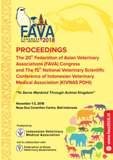AQ-5 The Study of the Determination of Toxoplasmosis as One of Quarantine Pests and Diseases for Animals (HPHK)
Abstract
Toxoplasmosis is one of the major zoonotic diseases spread throughout the world with varying degrees. This disease is caused by protozoa Toxoplasma gondii, intracellular parasite that can attack humans and all warm-blooded animals. Humans or animals suffering from toxoplasmosis do not show any specific clinical signs and often without signs at all because the disease is latent. Toxoplasmosis can be fatal and life-threatening in individuals with a decrease in the immune system.
Cats and other felidae is the definitive host for Toxoplasma gondii, a place where these parasites develop and multiply sexually. Toxoplasma gondii may develop intraintestinally (inside the intestinal tissue) as well as extraintestinally (outside the intestinal tissue) in feline’s body. Intraintestinal development forms a life stage called oocysts. Oocysts are excreted along with the feces which then serves as a source of transmission for other hosts, such as rats, goats, sheep, and humans.
Cases of toxoplasmosis have been found in various regions or areas of Indonesia both in humans and animals since 1970. Researches on toxoplasmosis in pets such as cats, livestock such as cattle and buffalo, goats, and pig were conducted from year to year. It proved that toxoplasmosis pulled a great interest from academics and researchers, both in human medicine and veterinary medicine.
The Government of the Republic of Indonesia through the Decree of the Minister of Agriculture Number 4026/Kpts/OT.140/4/2013 on the Stipulation of Strategic Transmissible Animal Diseases has established toxoplasmosis as one of strategic transmissible animal diseases (PHMS) that have been found in Indonesia. Based on the PHMS status and situation map of 2011-2014 published by the Directorate General of Animal Husbandry and Animal Health, Indonesian Ministry of Agriculture, cases of toxoplasmosis were reported in several provinces in Indonesia.
In the perspective of Indonesian animal quarantine, toxoplasmosis is not designated as Quarantine Pests and Diseases for Animals (HPHK), i.e. all animal pests and diseases that are stipulated by the government to be prevented from being entering into, spreading within, and leaving from the territory of the Republic of Indonesia. Therefore, Toxoplasma gondii-carrying media which transported were not treated as a subject for specific quarantine measures that aims to prevent the entry, spread, and exit of Toxoplasma gondii. This causes the efforts to prevent toxoplasmosis, whether carried out by the government, practitioners, academics, and the general public are not fully implemented.

